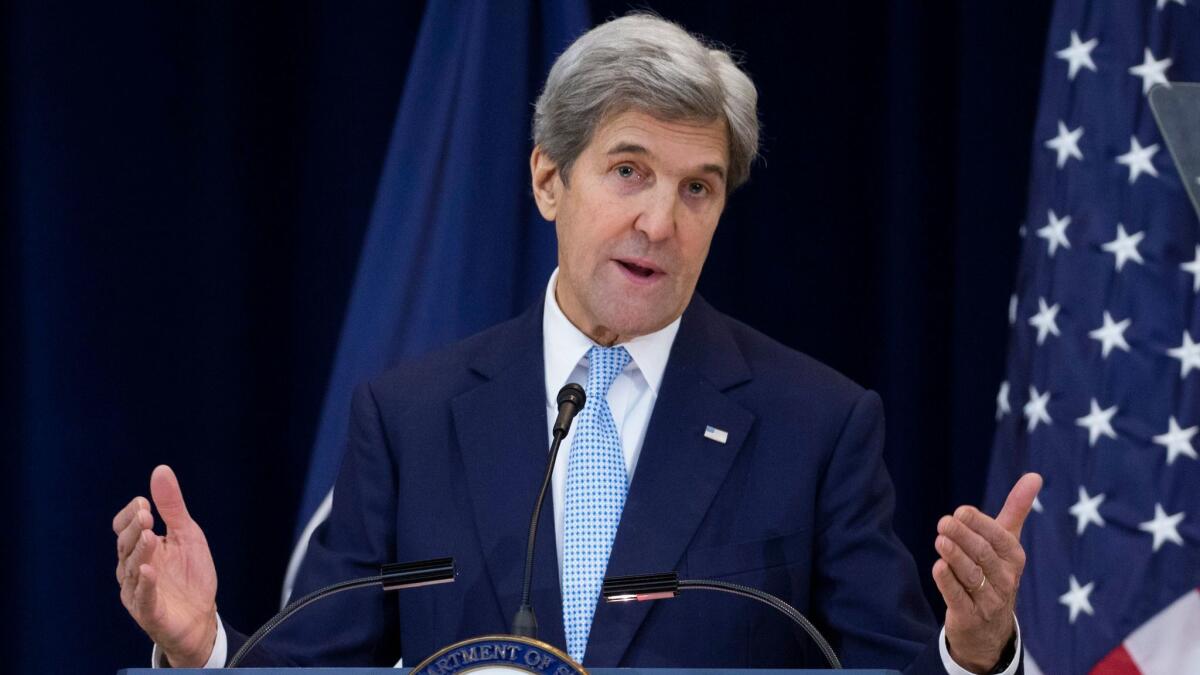Op-Ed: What Kerry’s speech says about the Obama administration’s Israel strategy

When the United Nations Security Council voted on Friday to censure Israel’s settlement-building policy, the United States shocked its allies by abstaining. This shock was a little odd given that the Obama administration has always opposed the settlements. Odder still, Secretary of State John Kerry felt the need to deliver an excruciating 80-minute speech on Wednesday that was essentially an apology for the abstention. The whole song-and-dance says a lot about Kerry’s well-meaning but ultimately ineffectual Mideast strategy.
While many, not just in Israel’s government, have already described Kerry’s speech as deeply critical, even “anti-Israel,” it was nothing of the sort. Kerry spoke convincingly of his deep love for Israel since his first visit there as a young senator in 1986, and of the many actions the Obama administration has taken to enhance Israel’s security and international standing. Indeed, while all previous U.S. administrations in the past five decades have on occasion abstained on Security Council resolutions critical of Israel, last week was a first for this administration.
By any traditional interpretation of the word, Kerry gave a devoutly Zionist speech. He gave ample justification for the Jewish state’s existence and placed much of the blame for the ongoing conflict on its Arab neighbors. He even made some concessions to Prime Minister Benjamin Netayahu’s official policy — such as acknowledging that the eventual agreement with the Palestinians will have to take into account the existence of “settlement blocs,” recognize Israel as a Jewish state and place no responsibility on Israel for the resettlement of Palestinian refugees.
Next month Kerry will begin writing his memoirs while Israel’s prime minister will still be in office, now with a like-minded president in the White House.
Other jarring notes for Palestinian listeners included the way Kerry described Palestinian-Israeli citizens as “Arab citizens who call Israel their home” and his use of Israeli data when mentioning the number of Palestinians living in the West Bank, instead of the Palestinian Authority’s figures.
The Obama administration has tried hard to show Israelis love. Only two weeks ago, Netanyahu stood beside Defense Secretary Ashton Carter as two American-made F-35 fighter-jets landed at Nevatim Airbase in the Negev. That night Netanyahu thanked President Obama for this latest addition to Israel’s arsenal.
The unbridgeable chasm remains the settlements. In the opinion of the Obama administration, and of many Israelis and American lovers of Israel, they are an immovable obstacle to peace and a threat to Israel’s very soul. For the Netanyahu government and its supporters, they are the natural embodiment of the return of the Jewish people to their historical homeland.
In the face of Netanyahu’s resolve, Kerry conceded that the U.S. “cannot dictate the peace.”
It was a tacit admission that in eight years, the Obama administration has failed to budge Netanyahu even an inch. Next month Kerry will begin writing his memoirs while Israel’s prime minister will still be in office, now with a like-minded president in the White House.
An hour before the speech, Netanyahu and President-elect Donald Trump were already high-fiving each other on Twitter. “Stay strong Israel, January 20th is fast approaching!” promised Trump. “Thank you for your warm friendship and your clear-cut support for Israel!”, Netanyahu tweeted back, with cute emojis of Israeli and U.S. flags.
Even before he took to the stage, Kerry was the jilted lover. But it is hard to feel sorry for him. He promised in his speech “practical suggestions” and “uncomfortable truths.” Instead he issued a cringe-inducing string of cliches. The six principles Kerry offered at the end of the speech were little more than the 16-year-old “Clinton Parameters” rehashed. In that period of time, the number of Israeli settlers has nearly doubled. Kerry has no sense of irony if these are his “practical suggestions.”
Even excusing the old chestnuts, what was the point of making such a speech now? Kerry is right: The settlements and the underlying policy of creeping annexation are disastrous for Israel’s future as a Jewish democracy. But an administration that failed so dismally at convincing Israel, or the Palestinians for that matter, to take any concrete steps away from the current stagnation has no business offering advice in its dying days.
Kerry’s swansong was one of crushing impotence and absolute irrelevance. No surprise there. As America’s senior diplomat, he allowed Vladimir Putin to have his way in Ukraine and Syria, acquiesced to Iran’s growing malignant influence across the Middle East and abandoned Syria’s rebels as they were massacred by the Assad regime. Kerry’s heart has always been in the right place; he loves Israel. But now even the Israelis who agree with him in principle have joined the long list of those he has let down.
Anshel Pfeffer is a columnist for Israeli daily Haaretz and The Economist’s correspondent in Israel.
Follow the Opinion section on Twitter @latimesopinion and Facebook
More to Read
A cure for the common opinion
Get thought-provoking perspectives with our weekly newsletter.
You may occasionally receive promotional content from the Los Angeles Times.










